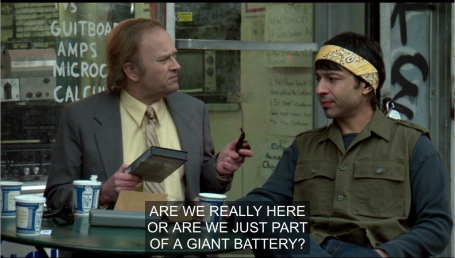Ruby Slippers
March 18, 2016 at 8:03 pm GR 6 comments
| Gabriel |
Rod Dreher at The American Conservative has a post on people invoking the concept of “social construction” with his lead example being a speech and debate team that always changes the subject to a critical race theory rant about the conventions of debate itself, even if the pre-specified debate topic is about national service or green energy or whatever. The judge then awards the match to this non sequitur, invoking “social constructionism” to explain himself.
I can get angry about this on a whole other level than Dreher does, precisely because I think social construction is a valuable concept. And I really do take the concept seriously. My PhD training is as a neo-institutionalist (ie, how organizational practices are socially constructed), I have an ASR on market information regimes (ie, how socially constructed market data shapes market behavior), and my current project is on relational work (ie, how exchange is socially constructed as market or social). I also advise grad students on these sorts of topics. So it’s not like I’m some angry epistemological realist who goes around giving swirlies to phenomenologists.
Social construction is a really useful concept, but unfortunately, this really important concept has the misfortune of being popular with idiots who don’t really understand it. When this sort of person says “x is socially constructed” the implication is “therefore we can ignore x.” When I lecture on social constructionism I ridicule this sort of thing as “ruby slippers” social constructionism, as if your sociology professor tells you “why Dorothy, you’ve had the power to solve inequality all along, just click your heels three times and say ‘race is a social construct,’ ‘race is a social construct,’ ‘race is a social construct.'” If you really grok social constructionism, the appropriate reaction to somebody invoking the concept in almost any practical context is to shrug and say “your point being?” If you actually read Berger and Luckmann rather than just get the gist of it from some guy with whom you are smoking weed, you’ll see that the key aspects of social constructionism are intersubjectivity and institutions. That is social construction is important because social interaction is premised on shared conventions and becomes deeply codified to the extent that for most purposes it might as well be objective.
Suppose you had two contractors bidding on remodeling your kitchen. One of them says that it will be done in X days, involving Y materials, and cost you $Z. The other gives you a fascinating (but at times dubious) lecture about whether time exists in the abstract or only relative to perception, the ugly history of exploitation in the formica industry, and the chartalist theory of money. You then go back to the first contractor, who is bewildered and has no rebuttal to the second contractor’s very, um, creative arguments. You would have to be an idiot to award the bid to the second contractor, even if you think they are right about everything they said. As it happens, I actually believe that time, kitchen materials, and money are all socially constructed. It is also true that kitchen remodeling is also a social construct and one of the conventions of that particular social construct is that you talk about things like time, material, and price rather than offer a critical perspective on the same.
Entry filed under: Uncategorized.

1. Alan Jacobs | March 19, 2016 at 5:06 am
Alan Jacobs | March 19, 2016 at 5:06 am
Gabriel, this is an important point and one I have been trying to communicate to people for years. I was first alerted to its significance through an essay Stanley Fish wrote thirty years ago called “Rhetoric.” There he talks about “the mistake … of turning the recognition of contingency into a way of avoiding contingency, as if contingency acknowledged were contingency transcended. You may know in general that the structure of your convictions is an historical artifact, but that knowledge does not transport you to a place where those convictions are no longer in force. We remain embedded in history even when we know that it is history we are embedded in, and while that knowledge may be satisfying in relation to alternative stories about our convictions (for example, that they correspond or should correspond to the unchanging nature of things), in relation to the particular convictions (including itself) by which we are now grasped and constituted, it is of no force whatsoever.”
2. gabrielrossman | March 19, 2016 at 11:08 am
gabrielrossman | March 19, 2016 at 11:08 am
I say it’s Gnosticism, and I say to Hell with it
3. Jay Livingston | March 21, 2016 at 5:20 am
Jay Livingston | March 21, 2016 at 5:20 am
Do the people who say that race is merely a social construction also talk about social class as though it weren’t?
4. Joseph Hertzlinger | March 21, 2016 at 12:23 pm
Joseph Hertzlinger | March 21, 2016 at 12:23 pm
English grammar is a social construction.
That does not mean we upmake grammar can will at,
5. Luck and Privilege – spottedtoad | March 25, 2016 at 7:47 pm
[…] be the result to a degree of discrimination or historical legacies of discrimination, of the “social construction of race” rather than of underlying biological difference. But they are still less well understood as […]
6. Jamy | April 8, 2016 at 3:58 pm
Jamy | April 8, 2016 at 3:58 pm
Worse are people who deny that social construction even exists. I once dated someone who said he “didn’t believe in it” because he couldn’t see it. He was also a socially conservative Republican. Yes, we broke up not too long after…though I should’ve done it right then.